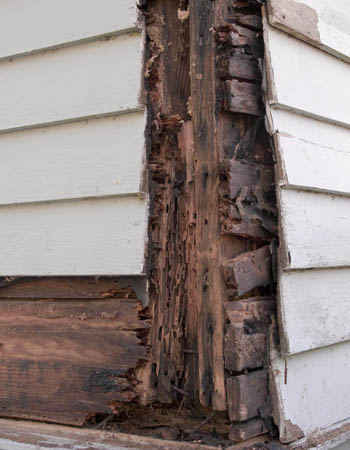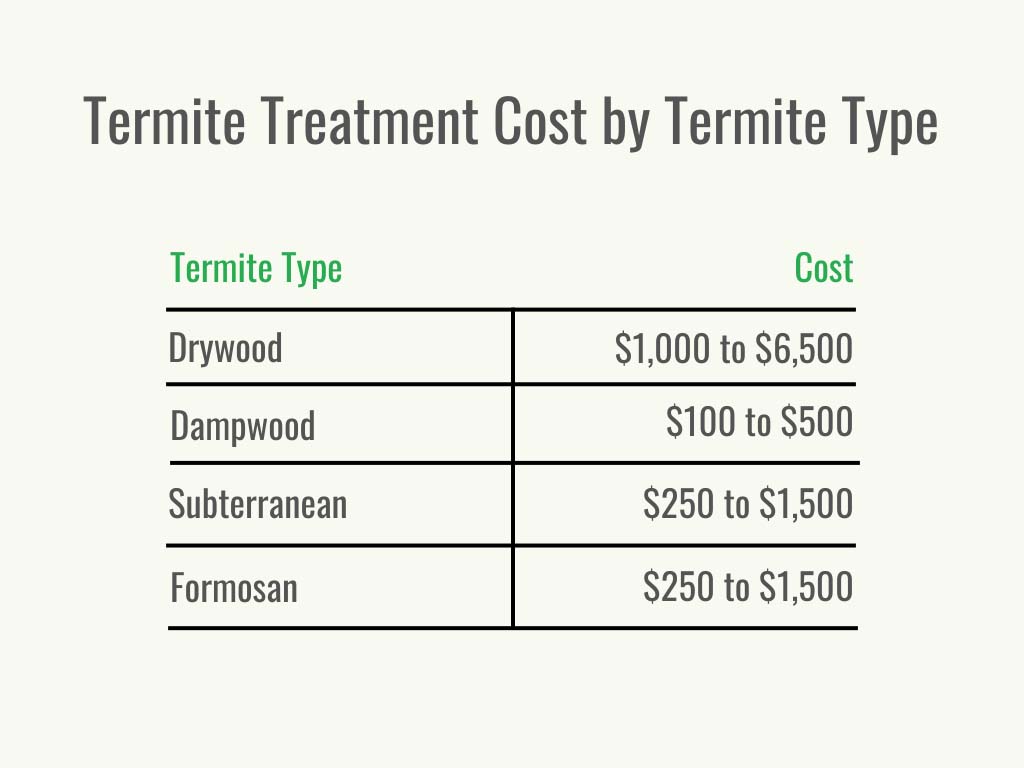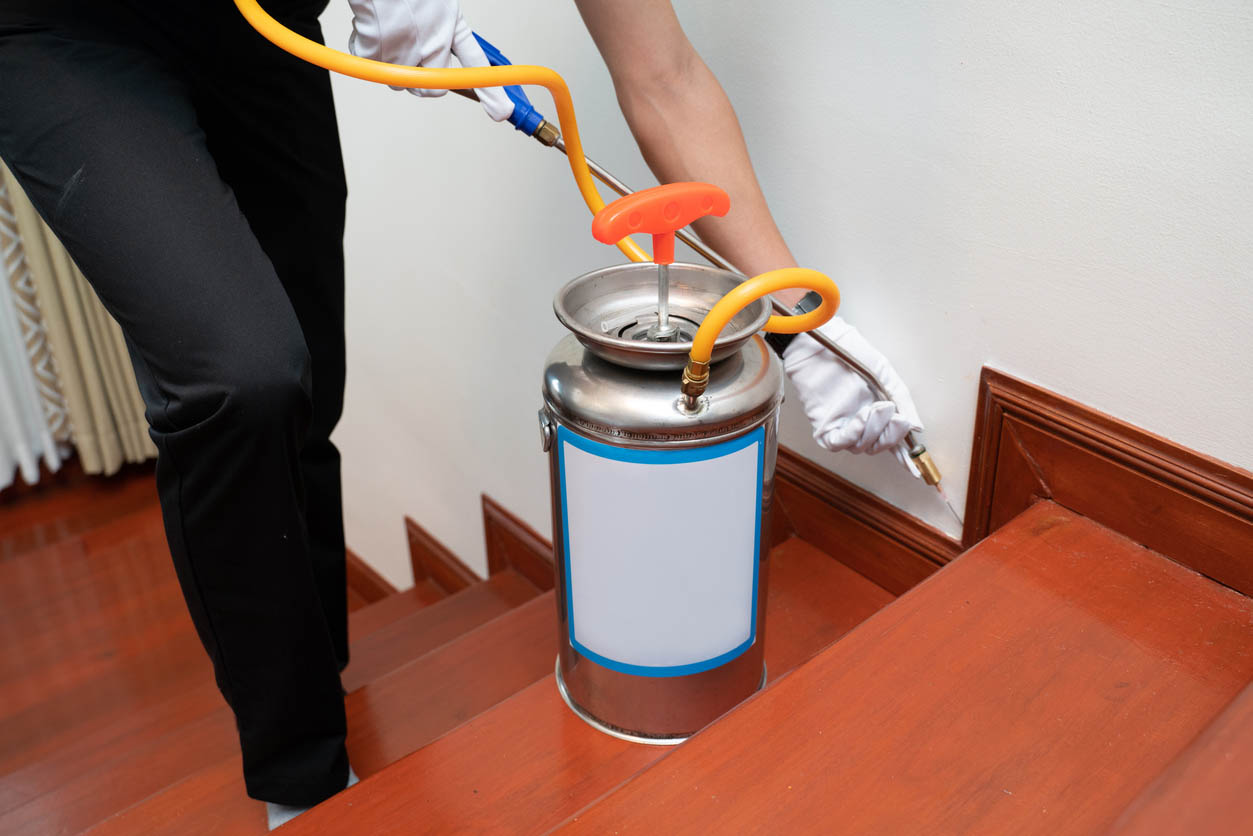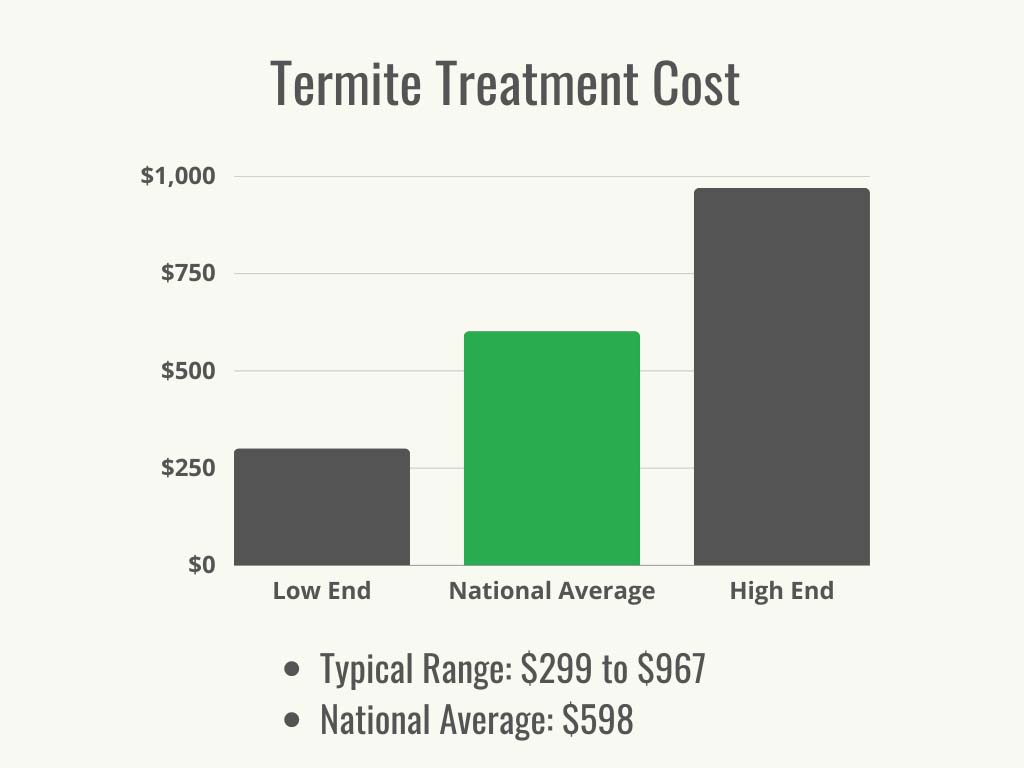We may earn revenue from the products available on this page and participate in affiliate programs. Learn More ›
Highlights
- The typical range for termite treatment costs is $229 to $967, with many homeowners paying a national average of $598.
- Cost factors for termite treatment costs include the termite type, infestation level, home size, treatment type, treatment frequency, termite control company, and geographic location.
- Homeowners who are seeing early warning signs of termites, have had them in the past, are interested in proactive treatment, or are selling their property are all candidates for this service.
- Professional termite treatment is the best way to eliminate the problem for good. Many termite control companies will also provide a retreatment guarantee to give homeowners peace of mind.
Dealing with termites is a necessary task for many homeowners. How much a homeowner pays for termite treatment depends on the severity of the termite infestation, the size of the area, and the number of treatments required. According to Angi and HomeAdvisor, the cost of termite treatment ranges from $229 to $967, with the national average around $598, or $3 to $16 per linear foot. A pest control professional can determine the type of treatment that will work best for an individual home. Chemical treatments, bait, fumigation, and prevention methods vary in cost. Knowing how much each termite treatment option costs will keep a homeowner’s budget in check.
Factors in Calculating Termite Treatment Cost

The factors that go into calculating termite treatment cost include the type of termites in the house, the extent of the infestation, the size of the structure, and the type and number of treatments required. Termite treatment cost ranges from $229 to $967, with the termite treatment average cost hovering around $598. This comes out to approximately $3 to $16 per linear foot. There are several methods available when treating a termite infestation in the home. A professional exterminator will discuss the following factors to determine the best option.
Termite Type
Termites are serious pests and can cause significant damage to a home, resulting in home repairs that can break the bank. There are four types of termites commonly found in the United States: drywood, dampwood, formosan, and subterranean termites. Termite removal costs can range from $218 to $2,500, depending on the type.
Drywood termites don’t require as much moisture as the other types and are not found in soil. These pests like to eat dead wood found in support joints. Drywood termite treatment costs from $1,000 to $6,500. According to Steven Dupuy, technical service manager and termite expert at Rentokil Terminix, “Different species cause different damage. Drywood termites have smaller colonies—up to 700 termites, so they do less damage. This species of termites [doesn’t] need ground contact and can swarm into a building to start a new colony.” Most exterminators will drill holes in wood and place baits or use a chemical gel or foam. If there is a large colony of drywood termites, house tenting may be the best choice for eliminating them.
Treatment for larger dampwood termites runs from $100 to $500. As their name implies, these pests eat damp wood. Eliminating standing water inside and outside the home is an essential step to discourage dampwood termites.
The formosan termite is a formidable variety that is rapidly spreading across the country. “Formosan termites can have seven million termites in a colony and can do a lot more damage in a shorter period of time,” says Dupuy. “This species of termites or subterranean species come from the soil.” Formosan termite treatments cost between $250 and $1,500.
Subterranean termites are one of the most destructive types. These are the ones that build mud tunnels and live in the soil. These aggressive termites are usually treated with baits, but chemicals can be used as well. Getting rid of these termites averages $250 to $1,500.

Infestation Level
The extent of the infestation will affect termite treatment cost. Visible termites, mud tunnels, or termite swarms are all signs of infestation. Seeing any sign of termites—including holes in wood, hollow-sounding timber, or quiet chewing noises—is a sign for the homeowner to contact a professional exterminator to take a look. Getting treatment as quickly as possible will help avoid damage to the home.
Home Size
Termite treatment costs can vary due to the size of the structure. Whole-home treatment can range as high as $2,500, but this cost can be higher if the home has many floors. On the other hand, smaller homes with only early signs of infestation may need only a spot treatment.
Treatment Type
Termite treatment is priced according to the type of treatment. Chemical treatments cost between $3 to $20 per linear foot and are usually needed until all termite activity is gone. Termite bait systems require more visits and are priced between $8 to $12 per linear foot. Tenting an entire home can cost from $800 to $2,500 or more. Tenting costs can be determined by a flat rate or by the linear foot, ranging from $5 to $20. Termite fumigation costs range from $10 to $20 per linear foot, and heat treatments average $800 to $2,500, or about $10 to $20 per linear foot. Treatment types will be covered in more detail below.
Treatment Frequency
Treatment frequency can depend on application being used—liquid treatments usually need to be applied only once. If a bait treatment is used, the termite exterminator may need to return occasionally to refill the station. Frequent visits will be much more expensive than a one-off appointment. Many companies offer plans for annual, quarterly, or monthly visits and can offer suggestions based on the severity of the infestation. According to Dupuy, “Liquid barrier treatments that go around the foundation or piers of a home can last on average 8 to 10 years depending on the product used and the rate it was applied at… There are rules on how often you can reapply these products that are set by state and EPA [Environmental Protection Agency] regulations. If you have a termite bait system around your home or building, as long as they are inspected on a regular basis, the only time you replace them is when termites have eaten them.” A single visit will usually cost between $300 and $480. The cost of a termite contract depends on the treatment frequency, as shown in the following table.
| Treatment Frequency | Annual Cost |
| Annual | $200 to $400 |
| Monthly | $660 to $900 |
| Quarterly | $240 to $560 |
Termite Control Company
Pest control costs can vary depending on the company that is hired. Some of the most popular national names in termite control are Ehrlich, Orkin, and Terminix. Ehrlich has the lowest starting price for an annual contract with a range of $500 to $1,000. Orkin’s prices range from about $540 to $660. Terminix termite treatment costs a bit more at $600 to $900. It can be overwhelming to choose a termite company, but customers will want to carefully weigh a company’s plan options, customer service, customer reviews, and treatment guarantees before signing a contract. Homeowners can start the search by reading a Terminix review, Orkin review, and a comparison of Orkin versus Terminix.
Geographic Location
While the national average cost of termite treatment is $598, the geographic location of a home can have a direct impact on the cost. This is due to the fact that labor costs in some regions and cities can differ, as well as there being different termite varieties in different parts of the country. In Tucson, Arizona, for example, a homeowner can expect to pay around $603 for termite treatment, but in Chicago, Illinois, the average price is significantly lower at $152. To get a sense of local prices, homeowners can look up “Termite exterminator near me.” Some average termite treatment costs in several major cities are listed below.
| City | Cost |
| Atlanta, Georgia | $479 |
| Boston, Massachusetts | $504 |
| Chicago, Illinois | $152 |
| Lincoln, Nebraska | $372 |
| Salt Lake City, Utah | $320 |
| Seattle, Washington | $217 |
| Tucson, Arizona | $603 |
Additional Costs and Considerations
When budgeting for termite treatment cost, homeowners will want to consider the possibility of additional fees, including termite monitoring stations and further treatment for termite reappearance. It’s also important that they take into account the extent of the damage to the home and the condition of the foundation.
Termite Inspection
Homeowners who think they may have termites or who are getting ready to sell their house will want to schedule a termite inspection. So how much is a termite inspection? It’s usually safe to assume the cost will fall between $50 to $280. During this initial inspection, a termite inspector will check the entire home and property for signs of termites including attics, basements, crawl spaces, cabinets, behind and underneath appliances, etc. Some companies offer free termite inspections to new clients, or they may waive the fee if treatment is scheduled. It’s generally recommended for a homeowner to get a termite treatment every 3 years.
Termite Monitoring Stations
Termite monitoring stations are small receptacles that can be placed around a home to check for termite activity. A termite expert will check monitoring stations monthly. If there are termites present, the station will be changed out for a new one that’s been treated with a slow-acting insecticide that prevents juvenile termites from growing into adults. These monitors average around $40 each, and the bait costs around $135 for a box of six.
Termite Bonds
Some pest control companies offer termite bonds, which are coverage plans that encompass the cost of termite control for a set period of time. Most termite bonds are in the range of $300 to $400 per year. This may not be worthwhile in an area that isn’t prone to termites, but homeowners with an ongoing infestation may save money by purchasing a termite bond rather than repeatedly paying for inspections, tenting, or repairs.
Damage Repair
Termites can cause extensive damage to a home; in fact, some types of termites can eat up to 13 ounces of wood a day as a colony. Treating a termite infestation is only one step of the process. Termite damage repair costs anywhere from $300 to $15,000. On average, the cost to repair framing can run up to $2,500, and the cost to install attic insulation is $1,700 to $2,100. The average price to repair and clean a crawl space can set a homeowner back $1,500 to $15,000. Termites are attracted to drywall and will feed on the paper lining; drywall repair can cost $300 to $1,000. A termite technician can help identify termite damage versus wood rot, as they can look similar to an untrained eye.
| Damage Repair | Cost |
| Attic insulation installation | $1,700 to $2,100 |
| Carpentry framing repair | $500 to $2,500 |
| Crawl space repair | $1,500 to $15,000 |
| Drywall repair | $300 to $1,000 |
Foundation Condition
Termites build tunnels and travel under the foundation of a house. From there, they can burrow in cracks in the foundation and eat their way through the wood framing of the structure. If a homeowner notices swarms of termites near their home’s foundation, they almost certainly have an infestation. The longer an infestation goes untreated, the more damage there will be to repair.
Termite Reappearance
Unfortunately, termites can reappear after treatment. This isn’t a sign of ineffective products or lazy technicians—when dealing with living creatures, especially ones that infest an area and grow colonies as quickly as termites, it’s incredibly challenging to ensure that every spot has been treated flawlessly. Most termite treatments last up to 5 years, but termites can make a comeback. Monitoring stations can help keep track of the situation, but the infestation may need another treatment since termites are aggressive pests. If a homeowner is under contract with a pest control company, exterminators will usually return for free or discounted visits as long as termites are present and still need to be removed.

Termite Treatment Cost by Type of Treatment
The method of termite treatment and the size of the area that needs to be treated can affect cost. The best termite treatment for each infestation will be unique to the species of termite, the severity of the infestation, and the home’s specific needs.
| Treatment Type | Cost per Linear Foot |
| Bait | $8 to $12 |
| Chemical | $3 to $20 |
| Fumigation | $10 to $20 |
| Heat treatment | $10 to $20 |
| Liquid termiticide | $4 to $14.50 |
| Tenting | $5 to $20 |
Bait
Termite bait treatment is priced at $8 to $12 per linear foot. Termite bait is a substance such as wood or paper that’s been treated with a termiticide. Termites are lured away from the home by baits that are placed in drilled holes in the ground. They will eat the bait and bring it back to the nest, where the rest of the termites will die. This method is commonly used to control subterranean termites. This treatment type isn’t as precise as chemical treatments, and additional costs may be incurred if additional termite traps are needed.
Chemical
Chemical treatments average $3 to $20 per linear foot. A chemical treatment uses a liquid termiticide such as arsenic trioxide, bifenthrin, fipronil, imidacloprid, or permethrin that is usually sprayed onto and around the foundation to repel and kill termites. Chemical treatments can be applied to soil, baits, chemically treated building materials, and wood treatments. Chemical treatment is the most common method to get rid of subterranean and drywood termites. This practice is also used for infestations that have not taken over the entire home and are centralized to the foundation.
Fumigation
Termite fumigation treatment ranges from $1,200 to $2,500, or $10 to $20 per linear foot. This method also involves tenting the entire house, but toxic fumes are pumped into the tent to kill the termites. People, plants, and pets will need to vacate the house for several days. This process is highly effective for getting rid of drywood termites.
Heat Treatment
Heat treatment costs between $800 to $2,500, or $10 to $20 per linear foot. This is an organic and chemical-free solution. The entire home is tented, and hot air is forced into it to raise the temperature to 150 degrees Fahrenheit. Termites cannot survive if the structural wood temperature reaches 120 degrees Fahrenheit for over 30 minutes. The house is then de-tented, and residents can return to the home once it has cooled. The process usually takes 8 hours
Liquid Termiticide
Liquid termiticide options are the most common and readily available for purchase at a home improvement store. The efficacy will depend on the termite variety and the application. Professional application is likely to be more thorough and potent than a DIY application. “With liquid treatments, [the main cost factor is] manual work. The technician has to trench around the house and drill patios,” says Dupuy. “It’s hard work and often costs more.” Liquid termiticides are approved for safe usage by the U.S. Environmental Protection Agency (EPA) as long as they are applied properly. Liquid termiticide is available at home improvement stores and runs from about $4 to $14.50 per linear foot.
Tenting
Termite tenting is similar to heat treating and involves enveloping the entire home inside a termite tent and fumigating the air inside. After the treatment has been given a chance to work, the tent is removed and the termite technicians can assess whether the process was successful with an inspection. Homeowners can expect to pay $5 to $20 per square foot, or a total of $800 to $2,500 for tenting.
Do I Need Termite Treatment?
Termite experts recommend termite treatment when there is any sign of their presence. Termites are aggressive and difficult to get rid of, but a professional can eliminate these pests. What follows are a few reasons a homeowner may need to get termite treatment.
Signs of Termites
Recognizing the signs of termites will make it possible for homeowners to tackle the problem as quickly as possible. Termites won’t always be visible; in fact, it’s more common to see termite droppings but no sign of termites. However, it’s still worth it for homeowners to look up what termites look like in case one appears. Aside from seeing swarms of termites around the foundation, homeowners will want to keep an eye out for mud tunnels around the foundation. Wood damage can appear behind walls and in furniture and flooring. Small holes in drywall, dropped wings, termite droppings that resemble sawdust, hollowed-out wood, and discoloration are all signs of termites.
Past Infestations
Most professional pest control companies will offer treatment plans if the home has had a past infestation. An annual termite contract averages $200 to $400. A professional will inspect the home and provide treatments if needed. A professional can also provide a customized prevention plan to minimize the risk of future infestations.
Proactive Termite Inspection
The best way to know for sure whether a home has termites is to schedule a termite inspection. Termite inspection cost ranges from $50 to $280. New houses must pass a termite inspection to protect the homeowner, and most companies will offer a free assessment for current owners. A professional will examine all home areas, including the attic, crawl space, basement, windows, floors, behind appliances, and inside closets and cabinets. Even if a homeowner knows the red flags of termite infestation, these pests can do severe damage before they even notice them—that’s why professional inspections are essential.
Selling a Home
For those who are selling a home with a history of termites, it’s best to get it treated before it goes on the market. Sellers must disclose the situation to any potential buyers, and many reputable pest control professionals will transfer the termite treatment plan warranty to the new homeowner.

Termite Treatment: DIY vs. Hiring a Professional
It may sound tempting for homeowners to save some money by treating their home for termites without hiring a professional. Some common DIY termite treatments are to use termite baits and termiticides purchased in a home improvement store. DIY methods are ineffective for getting rid of termites, but they may help as preventative measures. Experts recommend that a pest control company treat an active termite infestation. According to Dupuy, “The work is labor-intensive and the products used must be applied correctly for them to work properly. In most states, there are regulations that must be followed as well. Professionals go through a lot of training to use these products, and misapplications can be dangerous.” Chances are by the time the termites are noticeable, they’ve already done severe damage to the home. Many pest control companies will guarantee elimination of these pests and add peace of mind that a professional is in charge of the problem. Termite extermination professionals will scrutinize the home to determine the termite species or distinguish between signs of carpenter ants versus termites or other bugs that look like termites. They can also recognize the severity of the infestation, understand the treatment that will work the best, and safely treat the home.
How to Save Money on Termite Treatment Cost
Termite treatment costs can be expensive, and the additional fees associated with termite extermination can add up. One way to save money would be DIY, but there is the danger of damaging the home and putting residents at risk by mishandling insecticides. Below are a few other ways to save money on termite treatment costs.
- Use liquid chemicals. Liquid termiticides are less expensive than other treatment methods.
- Get multiple bids. Contacting three or more pest control companies can save you money, so shop around for the best treatment that’s right for your home.
- Purchase a termite home inspection plan. Termite home inspection maintenance plans can help you save money. Inspections are carried out monthly or biannually. A professional will check bait and traps during these inspections; the average visit costs between $25 and $50.
Questions to Ask About Termite Treatment
When vetting the best termite control companies to determine which is the best choice, homeowners will find that asking the right questions about termite treatment costs will help them minimize miscommunication, save money, and get the desired results. The following are some questions for homeowners to ask after looking up “termite treatment near me” and contacting a local pro.
- What is the cost of treatment?
- What type of termites are we dealing with?
- What is the best method to treat my home?
- How many times will you have to treat the house?
- What types of chemicals will you use?
- What are my options for chemical-free and organic treatments?
- What is the warranty?
- How long has your company been in business?
- What type of experience do the employees have?
FAQs
Deciding on which of the best pest control companies to hire and what type of treatment to use can be a daunting process. Below are some frequently asked questions about termite treatment cost to help guide these decisions.
Q. Can I treat my home for termites myself?
Eliminating termites requires training and a specialized skill set. Pest control professionals know the many hidden and difficult-to-reach areas where termites can enter the home. Equipment such as drills, borers, and large spray tanks filled with insecticide is used to treat a home. Large amounts of insecticide, sometimes hundreds of gallons, are needed to treat the area. This kind of job is best left to the professionals.
Q. Is termite treatment covered by insurance?
Homeowners insurance does not cover termite treatment, since it’s considered preventable damage.
Q. Can I sell a house with termites?
Yes, you can sell a house with termites, but it can be an arduous task. Sellers must disclose to any potential buyer that the house has termites or has had a termite problem in the past.
Sources: HomeAdvisor, Angi, Fixr


